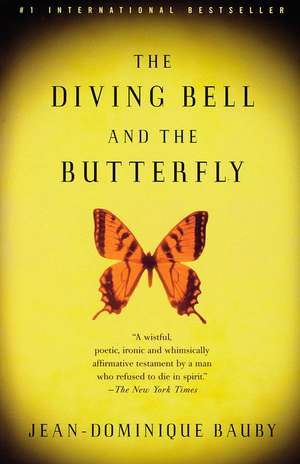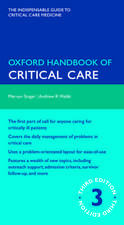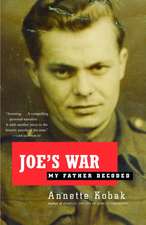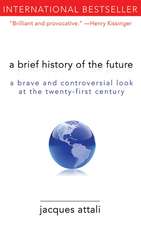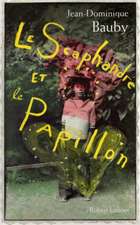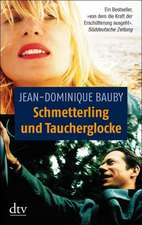The Diving Bell and the Butterfly: A Memoir of Life in Death
Autor Jean-Dominique Bauby Traducere de Jeremy Leggatten Limba Engleză Paperback – 31 mai 1998
By turns wistful, mischievous, angry, and witty, Bauby bears witness to his determination to live as fully in his mind as he had been able to do in his body. He explains the joy, and deep sadness, of seeing his children and of hearing his aged father's voice on the phone. In magical sequences, he imagines traveling to other places and times and of lying next to the woman he loves. Fed only intravenously, he imagines preparing and tasting the full flavor of delectable dishes. Again and again he returns to an "inexhaustible reservoir of sensations," keeping in touch with himself and the life around him.
Jean-Dominique Bauby died two days after the French publication of The Diving Bell and the Butterfly.
This book is a lasting testament to his life.
Preț: 86.82 lei
Nou
Puncte Express: 130
Preț estimativ în valută:
16.61€ • 17.77$ • 13.85£
16.61€ • 17.77$ • 13.85£
Carte disponibilă
Livrare economică 28 martie-11 aprilie
Preluare comenzi: 021 569.72.76
Specificații
ISBN-13: 9780375701214
ISBN-10: 0375701214
Pagini: 144
Dimensiuni: 131 x 205 x 10 mm
Greutate: 0.14 kg
Editura: Vintage Books USA
ISBN-10: 0375701214
Pagini: 144
Dimensiuni: 131 x 205 x 10 mm
Greutate: 0.14 kg
Editura: Vintage Books USA
Notă biografică
Jean-Dominique Bauby was born in France in 1952. He attended school in Paris. After working as a journalist for a number of years, Bauby became the editor-in-chief of Elle magazine in Paris in 1991.
On December 8, 1995 he had a stroke which left him with the condition known as locked-in syndrome. Bauby died on March 9, 1997. He was the father of two children, Theophile and Celeste.
From the Hardcover edition.
On December 8, 1995 he had a stroke which left him with the condition known as locked-in syndrome. Bauby died on March 9, 1997. He was the father of two children, Theophile and Celeste.
From the Hardcover edition.
Extras
Prologue
Through the frayed curtain at my window, a wan glow announces the break of day. My heels hurt, my head weighs a ton, and something like a giant invisible cocoon holds my whole body prisoner. My room emerges slowly from the gloom. I linger over every item: photos of loved ones, my children's drawings, posters, the little tin cyclist sent by a friend the day before the Paris-Roubaix bike race, and the IV pole hanging over the bed where I have been confined these past six months, like a hermit crab dug into his rock.
No need to wonder very long where I am, or to recall that the life I once knew was snuffed out Friday, the eighth of December, last year.
Up until then I had never even heard of the brain stem. I've since learned that it is an essential component of our internal computer, the inseparable link between the brain and the spinal cord. That day I was brutally introduced to this vital piece of anatomy when a cerebrovascular accident took my brain stem out of action. In the past, it was known as a "massive stroke," and you simply died. But improved resuscitation techniques have now prolonged and refined the agony. You survive, but you survive with what is so aptly known as "locked-in syndrome." Paralyzed from head to toe, the patient, his mind intact, is imprisoned inside his own body, unable to speak or move. In my case, blinking my left eyelid is my only means of communication.
Of course, the party chiefly concerned is the last to hear the good news. I myself had twenty days of deep coma and several weeks of grogginess and somnolence before I truly appreciated the extent of the damage. I did not fully awake until the end of January. When I finally surfaced, I was in Room 119 of the Naval Hospital at Berck-sur-Mer, on the French Channel coast --- the same Room 119, infused now with the first light of day, from which I write.
An ordinary day. At seven the chapel bells begin again to punctuate the passage of time, quarter hour by quarter hour. After their night's respite, my congested bronchial tubes once more begin their noisy rattle. My hands, lying curled on the yellow sheets, are hurting, although I can't tell if they are burning hot or ice cold. To fight off stiffness, I instinctively stretch, my arms and legs moving only a fraction of an inch. It is often enough to bring relief to a painful limb.
My diving bell becomes less oppressive, and my mind takes flight like a butterfly. There is so much to do. You can wander off in space or in time, set out for Tierra del Fuego or for King Midas's court. You can visit the woman you love, slide down beside her and stroke her still-sleeping face. You can build castles in Spain, steal the Golden Fleece, discover Atlantis, realize your childhood dreams and adult ambitions.
Enough rambling. My main task now is to compose the first of these bedridden travel notes so that I shall be ready when my publisher's emissary arrives to take my dictation, letter by letter. In my head I churn over every sentence ten times, delete a word, add an adjective, and learn my text by heart, paragraph by paragraph.
Seven-thirty. The duty nurse interrupts the flow of my thoughts. Following a well-established ritual, she draws the curtain, checks tracheostomy and drip feed, and turns on the TV so I can watch the news. Right now a cartoon celebrates the adventures of the fastest frog in the West. And what if I asked to be changed into a frog? What then?
The Photo
The last time I saw my father, I shaved him. It was the week of my stroke. He was unwell, so I had spent the night at his small apartment near the Tuileries gardens in Paris. In the morning, after bringing him a cup of milky tea, I decided to rid him of his few days' growth of beard. The scene has remained engraved in my memory.
Hunched in the red-upholstered armchair where he sifts through the day's newspapers, my dad bravely endures the rasp of the razor attacking his loose skin. I wrap a big towel around his shriveled neck, daub thick lather over his face, and do my best not to irritate his skin, dotted here and there with small dilated capillaries. From age and fatigue, his eyes have sunk deep into their sockets, and his nose looks too prominent for his emaciated features. But, still flaunting the plume of hair --- now snow white --- that has always crowned his tall frame, he has lost none of his splendor.
All around us, a lifetime's clutter has accumulated; his room calls to mind one of those old persons' attics whose secrets only they can know --- a confusion of old magazines, records no longer played, miscellaneous objects. Photos from all the ages of man have been stuck into the frame of a large mirror. There is dad, wearing a sailor suit and playing with a hoop before the Great War; my eight-year-old daughter in riding gear; and a black-and-white photo of myself on a miniature-golf course. I was eleven, my ears protruded, and I looked like a somewhat simpleminded schoolboy. Mortifying to realize that at that age I was already a confirmed dunce.
I complete my barber's duties by splashing my father with his favorite aftershave lotion. Then we say goodbye; this time, for once, he neglects to mention the letter in his writing desk where his last wishes are set out.
We have not seen each other since. I cannot quit my seaside confinement. And he can no longer descend the magnificent staircase of his apartment building on his ninety-two-year-old legs. We are both locked-in cases, each in his own way: myself in my carcass, my father in his fourth-floor apartment. Now I am the one they shave every morning, and I often think of him as a nurse's aide laboriously scrapes my cheeks with a week-old blade. I hope that I was a more attentive Figaro.
Every now and then he calls, and I listen to his affectionate voice, which quivers a little in the receiver they hold to my ear. It cannot be easy for him to speak to a son who, as he well knows, will never reply. He also sent me the photo of me at the miniature-golf course. At first I did not understand why. It would have remained a mystery if someone had not thought to look at the back of the print. Suddenly, in my own personal movie theater, the forgotten footage of a spring weekend began to unroll, when my parents and I had gone to take the air in a windy and not very sparkling seaside town. In his strong, angular handwriting, dad had simply noted: Berck-sur-Mer, April 1963.
From the Hardcover edition.
Through the frayed curtain at my window, a wan glow announces the break of day. My heels hurt, my head weighs a ton, and something like a giant invisible cocoon holds my whole body prisoner. My room emerges slowly from the gloom. I linger over every item: photos of loved ones, my children's drawings, posters, the little tin cyclist sent by a friend the day before the Paris-Roubaix bike race, and the IV pole hanging over the bed where I have been confined these past six months, like a hermit crab dug into his rock.
No need to wonder very long where I am, or to recall that the life I once knew was snuffed out Friday, the eighth of December, last year.
Up until then I had never even heard of the brain stem. I've since learned that it is an essential component of our internal computer, the inseparable link between the brain and the spinal cord. That day I was brutally introduced to this vital piece of anatomy when a cerebrovascular accident took my brain stem out of action. In the past, it was known as a "massive stroke," and you simply died. But improved resuscitation techniques have now prolonged and refined the agony. You survive, but you survive with what is so aptly known as "locked-in syndrome." Paralyzed from head to toe, the patient, his mind intact, is imprisoned inside his own body, unable to speak or move. In my case, blinking my left eyelid is my only means of communication.
Of course, the party chiefly concerned is the last to hear the good news. I myself had twenty days of deep coma and several weeks of grogginess and somnolence before I truly appreciated the extent of the damage. I did not fully awake until the end of January. When I finally surfaced, I was in Room 119 of the Naval Hospital at Berck-sur-Mer, on the French Channel coast --- the same Room 119, infused now with the first light of day, from which I write.
An ordinary day. At seven the chapel bells begin again to punctuate the passage of time, quarter hour by quarter hour. After their night's respite, my congested bronchial tubes once more begin their noisy rattle. My hands, lying curled on the yellow sheets, are hurting, although I can't tell if they are burning hot or ice cold. To fight off stiffness, I instinctively stretch, my arms and legs moving only a fraction of an inch. It is often enough to bring relief to a painful limb.
My diving bell becomes less oppressive, and my mind takes flight like a butterfly. There is so much to do. You can wander off in space or in time, set out for Tierra del Fuego or for King Midas's court. You can visit the woman you love, slide down beside her and stroke her still-sleeping face. You can build castles in Spain, steal the Golden Fleece, discover Atlantis, realize your childhood dreams and adult ambitions.
Enough rambling. My main task now is to compose the first of these bedridden travel notes so that I shall be ready when my publisher's emissary arrives to take my dictation, letter by letter. In my head I churn over every sentence ten times, delete a word, add an adjective, and learn my text by heart, paragraph by paragraph.
Seven-thirty. The duty nurse interrupts the flow of my thoughts. Following a well-established ritual, she draws the curtain, checks tracheostomy and drip feed, and turns on the TV so I can watch the news. Right now a cartoon celebrates the adventures of the fastest frog in the West. And what if I asked to be changed into a frog? What then?
The Photo
The last time I saw my father, I shaved him. It was the week of my stroke. He was unwell, so I had spent the night at his small apartment near the Tuileries gardens in Paris. In the morning, after bringing him a cup of milky tea, I decided to rid him of his few days' growth of beard. The scene has remained engraved in my memory.
Hunched in the red-upholstered armchair where he sifts through the day's newspapers, my dad bravely endures the rasp of the razor attacking his loose skin. I wrap a big towel around his shriveled neck, daub thick lather over his face, and do my best not to irritate his skin, dotted here and there with small dilated capillaries. From age and fatigue, his eyes have sunk deep into their sockets, and his nose looks too prominent for his emaciated features. But, still flaunting the plume of hair --- now snow white --- that has always crowned his tall frame, he has lost none of his splendor.
All around us, a lifetime's clutter has accumulated; his room calls to mind one of those old persons' attics whose secrets only they can know --- a confusion of old magazines, records no longer played, miscellaneous objects. Photos from all the ages of man have been stuck into the frame of a large mirror. There is dad, wearing a sailor suit and playing with a hoop before the Great War; my eight-year-old daughter in riding gear; and a black-and-white photo of myself on a miniature-golf course. I was eleven, my ears protruded, and I looked like a somewhat simpleminded schoolboy. Mortifying to realize that at that age I was already a confirmed dunce.
I complete my barber's duties by splashing my father with his favorite aftershave lotion. Then we say goodbye; this time, for once, he neglects to mention the letter in his writing desk where his last wishes are set out.
We have not seen each other since. I cannot quit my seaside confinement. And he can no longer descend the magnificent staircase of his apartment building on his ninety-two-year-old legs. We are both locked-in cases, each in his own way: myself in my carcass, my father in his fourth-floor apartment. Now I am the one they shave every morning, and I often think of him as a nurse's aide laboriously scrapes my cheeks with a week-old blade. I hope that I was a more attentive Figaro.
Every now and then he calls, and I listen to his affectionate voice, which quivers a little in the receiver they hold to my ear. It cannot be easy for him to speak to a son who, as he well knows, will never reply. He also sent me the photo of me at the miniature-golf course. At first I did not understand why. It would have remained a mystery if someone had not thought to look at the back of the print. Suddenly, in my own personal movie theater, the forgotten footage of a spring weekend began to unroll, when my parents and I had gone to take the air in a windy and not very sparkling seaside town. In his strong, angular handwriting, dad had simply noted: Berck-sur-Mer, April 1963.
From the Hardcover edition.
Descriere
In 1995, Jean-Dominique Bauby, the witty, gregarious editor of French "Elle", suffered a stroke that left him totally paralyzed, able to communicate only by blinking his left eye. By doing so, he was able to compose this book--at once a record of appalling suffering and a testament to the endurance of the human spirit.
